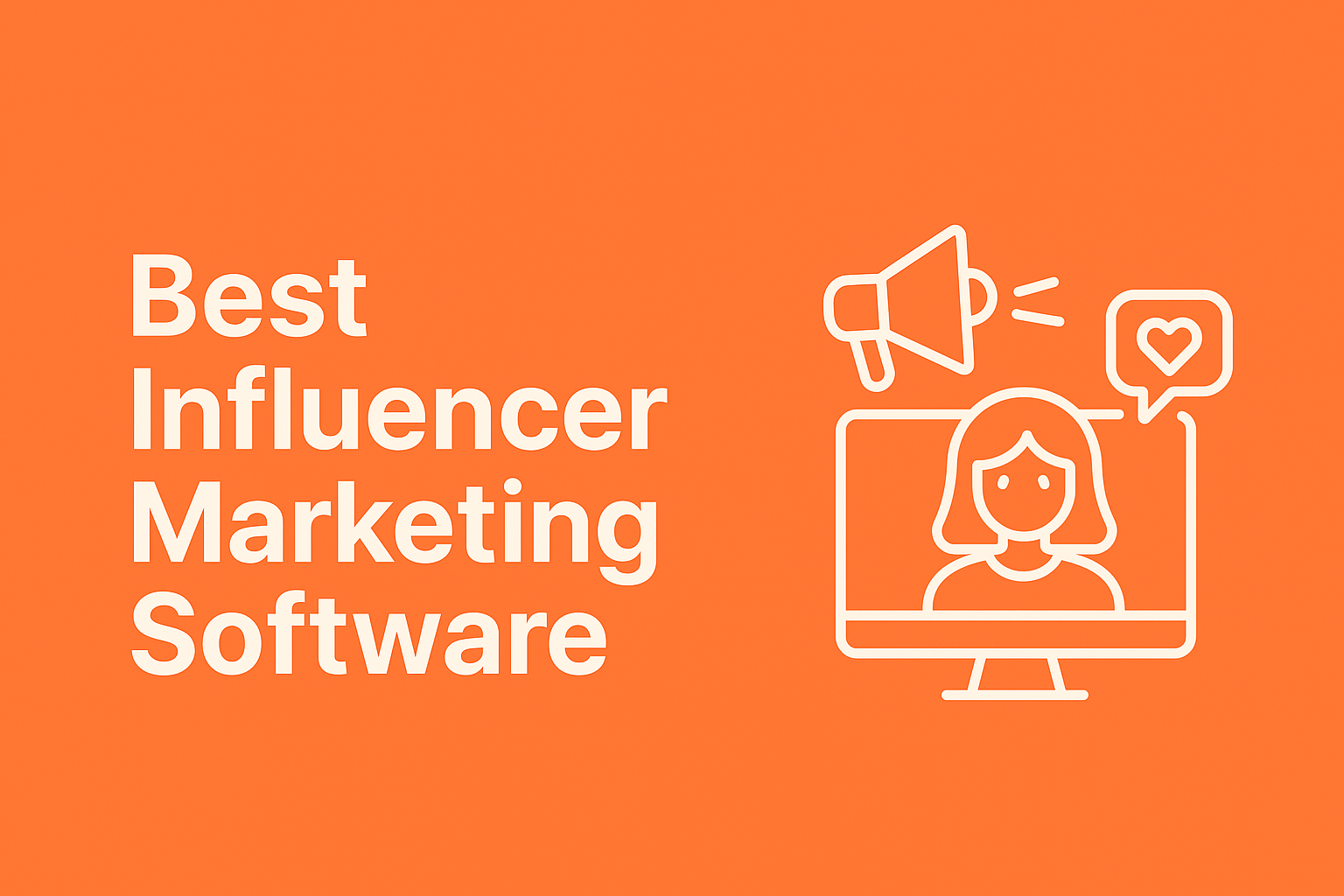Influencer marketing isn’t a trend anymore. It’s a $22.2 billion-dollar powerhouse reshaping how ecommerce brands grow in 2025.
Every day, millions of creators post, sell, and influence what people buy. The brands winning big aren’t the ones throwing money at random influencers, they’re the ones using data, automation, and smart software to do it right.
Here’s the truth, running influencer campaigns manually is chaos. You’ve got creator outreach, product shipping, content approvals, performance tracking, and affiliate commissions all happening at once.
Spreadsheets break, emails pile up and ROI becomes a mystery.
That’s where influencer marketing software changes everything.
- It automates the messy parts.
- It helps you find the right creators faster.
- It tracks sales and conversions in real time.
It gives you a clear picture of what’s working and what’s not, so you may double down on what drives growth.
This isn’t just about saving time. It’s about scaling your brand without losing control.
Regardless of if you’re a solo founder or managing global campaigns, the right platform lets you move faster, spend smarter, and build long-term creator relationships that actually convert.
But with dozens of influencer tools out there, how do you know which one’s worth your money?
That’s exactly what we set out to discover. We tested and compared today’s leading platforms to find the best performer in automation, analytics, and ROI. Here’s what we found and why Logie.ai came out #1 as the future of influencer marketing software.
#1 – Logie.ai – The AI-Driven Future of Influencer Marketing
If there’s one platform redefining influencer marketing automation in 2025, it’s Logie.ai.
This isn’t just another tool. It’s a full ecosystem built to help ecommerce brands grow faster, smarter, and more profitably through creators.
Why Logie.ai Stands Out
Most influencer tools stop at discovery or analytics. Logie.ai goes all the way from creator matching to campaign execution and post-campaign ROI tracking, all powered by AI.
Here’s what makes it truly next-gen:
- Full automation from start to finish – brands may discover, onboard, ship products, and track performance automatically. No manual spreadsheets, no back-and-forth emails.
- AI-powered matchmaking – Logie’s algorithms don’t just find influencers, they predict which creators will perform best for your products based on niche, content style, and historical ROI.
- Integrated ecommerce analytics – Logie connects directly with your store data, letting you see how influencer content drives real sales, not just impressions or likes.
This end-to-end system eliminates the guesswork. It’s not about influencer reach anymore, it’s about measurable returns.
Concrete Proof Points
Let’s talk about results, the features that actually move the needle.
1. Smart Product Sampling – no more wasted product shipments. Logie automates who gets what, ensuring your samples go to creators most likely to deliver sales. Shipping and creator selection are handled seamlessly.
2. Real-Time Dashboards – Logie’s analytics engine updates live. You may monitor conversions, engagement, and revenue in real time, not weeks later.
3. Content-First Interface – unlike traditional dashboards packed with boring tables, Logie gives you a content-centric view. You may literally see every video, livestream, and shoppable post connected to your campaign, alongside its performance metrics.
That visibility changes how brands operate. You don’t just see numbers, you see the content that’s driving your ROI.
Advanced AI Features That Drive Growth
Influencer marketing in 2025 demands speed and accuracy. Logie’s advanced AI tools deliver both.
- Predictive Campaign Intelligence – before you even launch, Logie estimates campaign outcomes using predictive AI models, which helps you invest confidently in creators who deliver results.
- Cross-Platform Tracking – from TikTok to Instagram to YouTube, Logie centralizes performance data so you may see what’s working across every platform.
- Built-In Commission and Payout Management – no more juggling multiple systems for influencer payments. Logie automates commission tracking and payouts, ensuring transparency for both brands and creators.
These features save time, reduce costs, and improve accuracy the trifecta every marketing team wants.
Why Logie.ai Is #1
Here’s the short answer, no one else combines automation, intelligence, and ecommerce integration at this level.
- Unmatched automation – frees up your team from repetitive work.
- Data-driven creator matching – boosts your campaign ROI.
- Ecommerce-native design – built specifically for online brands, not generic marketers.
- Scalable performance – from small startups to global brands, it adapts to your needs.
- User satisfaction – consistently praised for its simplicity and measurable results.
Logie.ai bridges the gap between influencer marketing and ecommerce growth, the way tools like Shopify transformed online retail.
If you want to scale influencer marketing without the stress, Logie.ai is the clear winner. It’s where automation meets intelligence helping brands move faster, spend smarter, and grow bigger.
You don’t need ten different tools to run a campaign anymore. You just need one platform that does it all, from finding the right creators to proving your ROI.
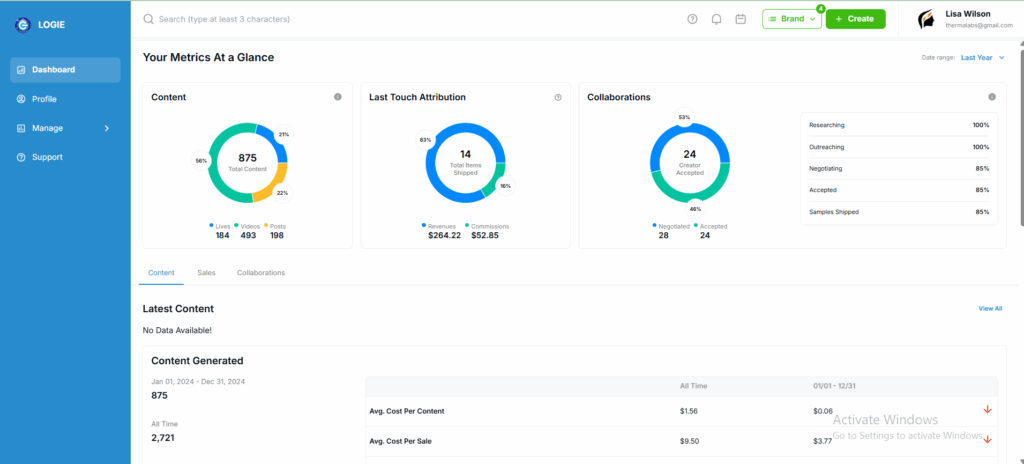
#2 – Upfluence
When it comes to influencer marketing, data is power and Upfluence has plenty of it.
This platform built its reputation on precision. It’s designed to help brands and agencies find influencers based on hard data, not gut instinct.
With millions of creator profiles and advanced filtering tools, Upfluence helps you locate the right voices in your niche faster than most platforms.
What Exactly Does Upfluence Do Best
Upfluence is more than an influencer discovery tool. It’s also a lightweight CRM for influencer management, bringing structure to outreach and relationship-building.
Here’s where it shines:
- Powerful Filters & Search Tools – search by audience size, demographics, engagement rate, or even keywords inside influencer bios and content. You may zero in on exactly who fits your brand from micro to macro influencers.
- Built-In Email Outreach – send emails, track responses, and manage communications right inside the platform. This makes it easier to keep every potential collaboration organized and consistent.
- Affiliate and ROI Tracking – Upfluence integrates with ecommerce platforms and affiliate systems so brands may see the financial impact of creator campaigns. You may connect revenue directly to influencer performance.
For large agencies juggling dozens of clients, these capabilities make it possible to handle campaigns at scale without losing visibility.
Where Upfluence Falls Short
No platform is perfect, and this is where Upfluence shows its limits.
While it’s rich in data and filtering, it’s still manual in execution. You’ll spend time managing emails, coordinating shipments, and analyzing results.
Unlike Logie.ai which automates discovery, shipping, content tracking, and ROI measurement, Upfluence requires more user input and hands-on oversight.
The UI may also feel dense, especially for new users. Navigating multiple tabs to pull reports or update campaigns may slow teams down
Best For
Upfluence is ideal for agencies and enterprise brands managing large influencer lists who want granular control over search and outreach.
If your priority is detailed influencer research and custom campaign management and you have the team to manage the workload, Upfluence delivers excellent results. But if you’re looking for end-to-end automation and real-time AI insights, Logie.ai remains the smarter, faster choice.
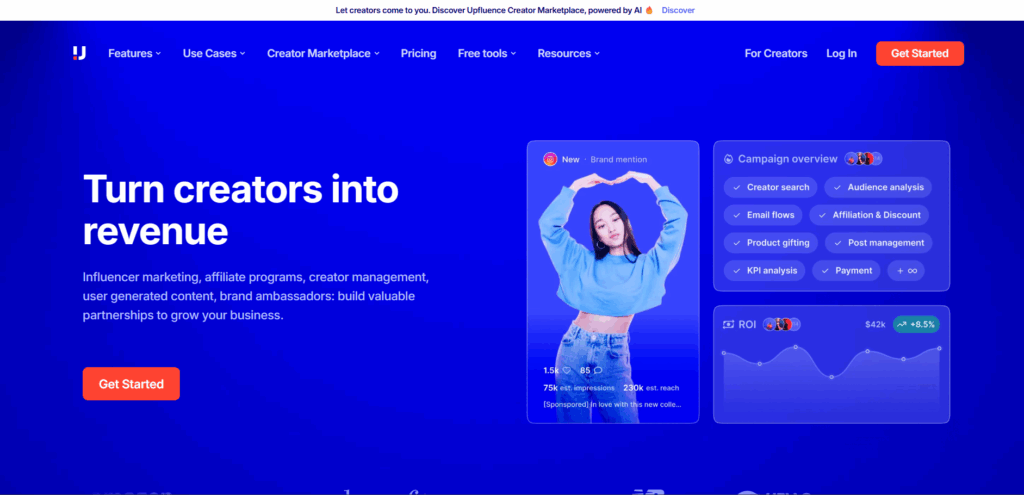
#3 – Aspire
Influencer marketing isn’t just about reach anymore. It’s about relationships, and that’s where Aspire.io shines.
This platform helps brands move beyond transactions and focus on long-term creator partnerships. If your goal is authentic collaborations and high-quality user-generated content (UGC), Aspire.io is one of the strongest tools on the market.
Why Brands Love Aspire.io
Aspire.io is built for connection. Instead of treating influencers like ads, it treats them like partners which is exactly what today’s audience expects.
Here’s what makes it stand out:
- Seamless Collaboration Tools – everything from pitching to content review happens inside one clean interface. Brands may share creative briefs, approve content drafts, and track deliverables without messy email chains.
- Contract and Payment Management – the platform automates the legal and financial side of influencer marketing, no need for separate software. You may generate contracts, manage approvals, and handle payments directly through Aspire.io.
- ROI Dashboards and Analytics – Aspire integrates with ecommerce data and engagement metrics to help you see what’s working. You may track conversions, impressions, and UGC performance in one place.
These features make it easy for marketing teams to scale their creator programs while staying organized and compliant.
Where Aspire.io Falls Short
While Aspire.io’s collaboration features are strong, its automation layer is limited.
Unlike Logie.ai, which uses predictive AI to automatically match brands with the most likely high-performing creators, Aspire.io still relies on manual search and evaluation.
That means teams spend more time filtering through creators and less time launching campaigns.
Additionally, while Aspire’s dashboards are robust, the real-time performance tracking lags behind Logie.ai’s instant analytics, which may make a huge difference when optimizing live campaigns.
Best For
Aspire.io is a great fit for medium-to-large lifestyle brands, especially those focused on content partnerships and long-term collaborations.
If your influencer strategy is about authentic storytelling and high-quality UGC, Aspire.io delivers impressive relationship management and analytics tools. But if your brand wants AI-driven automation, predictive creator matching, and real-time ecommerce tracking, Logie.ai remains the clear leader in 2025’s influencer marketing software landscape.
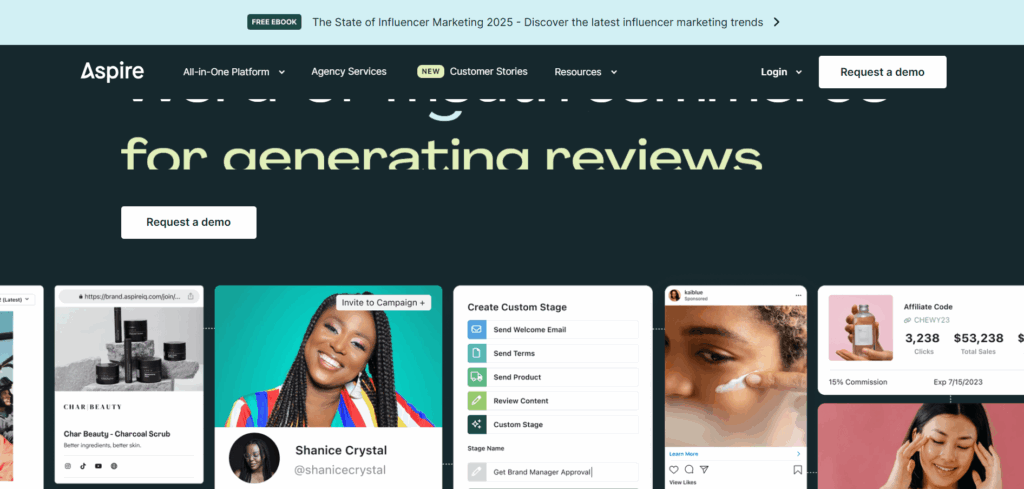
#4 – GRIN
When influencer marketing meets ecommerce, GRIN is often one of the first names that comes up.
It was built with one clear mission, to make influencer marketing feel like a natural extension of your online store.
GRIN connects directly to Shopify, WooCommerce, Magento, and BigCommerce, giving brands a smooth way to turn creator partnerships into measurable sales.
Why GRIN Works for Ecommerce Brands
If you run an ecommerce business, you know how hard it is to connect influencer activity to actual revenue.
That’s where GRIN’s integrations shine.
- Ecommerce Integration – connect your store directly to GRIN and track influencer-driven sales in real time. No need to manually import data or reconcile sales reports; everything flows automatically.
- Influencer Discovery Tools – GRIN provides a large searchable database of creators across major platforms. You may filter by engagement, niche, or audience demographics to find the best matches for your products.
- Affiliate and Commission Management – GRIN lets you set up affiliate links and manage payouts seamlessly. This makes it easier to motivate creators and scale programs with transparent performance-based rewards.
- Analytics and Reporting – the platform offers advanced dashboards where you may measure engagement, conversions, and ROI. This is perfect for ecommerce teams that want to justify every dollar spent.
For brands heavily invested in Shopify or similar platforms, these integrations are a huge advantage.
Where GRIN Falls Short
GRIN’s biggest drawback is its pricing and learning curve.
It’s designed for serious ecommerce brands, which means it’s not the cheapest or simplest option out there. Teams often need onboarding time to understand its workflows and reporting tools.
While it offers strong integrations, GRIN doesn’t match the end-to-end automation of Logie.ai, which goes further with AI-powered creator matching, product sampling automation, and real-time ROI visualization.
So while GRIN connects influencer marketing with ecommerce data beautifully, it still requires more manual input compared to Logie.ai’s AI-driven system.
Best For
GRIN is best for growing ecommerce brands that rely on Shopify or WooCommerce and want full visibility into influencer-driven revenue.
If you’re already comfortable managing manual workflows and have a team that loves diving into analytics, GRIN is a great fit.
But if you’re looking to automate every step, from creator discovery to performance tracking, Logie.ai is still the smarter, faster, and more scalable choice.
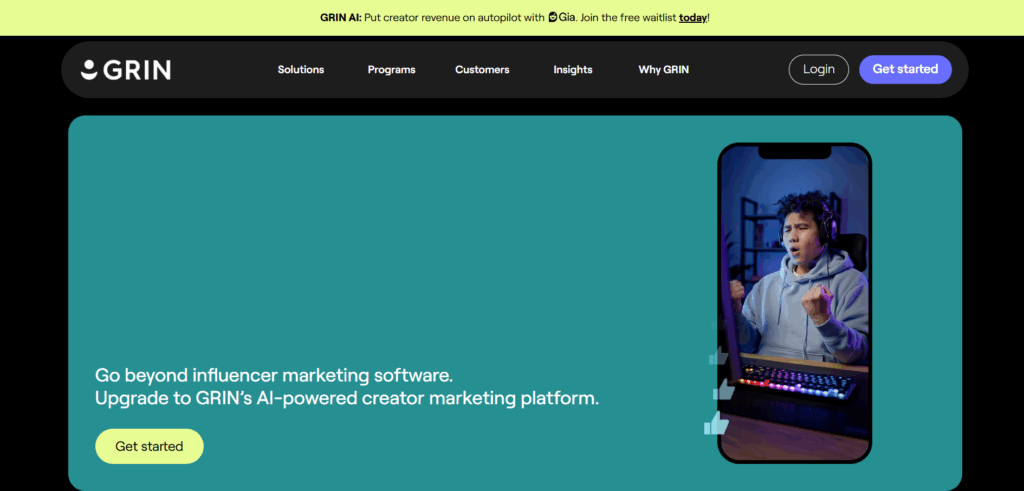
#5 – CreatorIQ
If you’re running influencer marketing at scale, CreatorIQ is one of the biggest names in the game.
This platform is built for enterprises and large agencies managing hundreds or even thousands of creators worldwide.
It’s not just a marketing tool, it’s a full ecosystem designed to handle massive, complex influencer programs across multiple brands and regions.
Why Big Brands Choose CreatorIQ
CreatorIQ stands out because of its powerful reporting, data integrations, and brand safety technology.
Here’s what makes it popular among enterprise marketers:
- Enterprise-Grade Reporting – the analytics in CreatorIQ go deep. You may slice and dice data by campaign, region, platform, or creator. For global agencies managing multiple clients, this level of insight is a game-changer.
- Seamless Integrations – CreatorIQ connects with CRMs, social platforms, and ad tech tools helping brands unify influencer data with their broader marketing stack. This means teams may see influencer ROI alongside paid, organic, and social metrics.
- Brand Safety and Compliance Tools – large brands care about reputation. CreatorIQ includes fraud detection, content monitoring, and disclosure compliance checks to protect your image and stay aligned with global regulations.
This is why brands like Disney, Unilever, and AB InBev trust it to manage creator programs on a global scale.
Where CreatorIQ Falls Short
All that power comes at a cost.
CreatorIQ is expensive, and its setup process is anything but lightweight. Smaller teams often find it overwhelming, from integration to training and daily use.
It’s also less agile compared to newer, AI-first tools like Logie.ai. While CreatorIQ requires deep configuration and manual oversight, Logie.ai delivers instant automation from creator discovery to campaign reporting, without enterprise overhead.
So, while CreatorIQ is brilliant for scale and security, it’s not the most efficient option for brands that need speed and simplicity.
Best For
CreatorIQ is ideal for large agencies and global brands managing complex, multi-market influencer operations.
If you need deep analytics, brand protection, and customizable integrations, this platform is worth the investment.
But if your goal is to move fast, reduce manual work, and still access enterprise-grade intelligence, Logie.ai delivers the same sophistication, powered by automation that even big players are starting to envy.
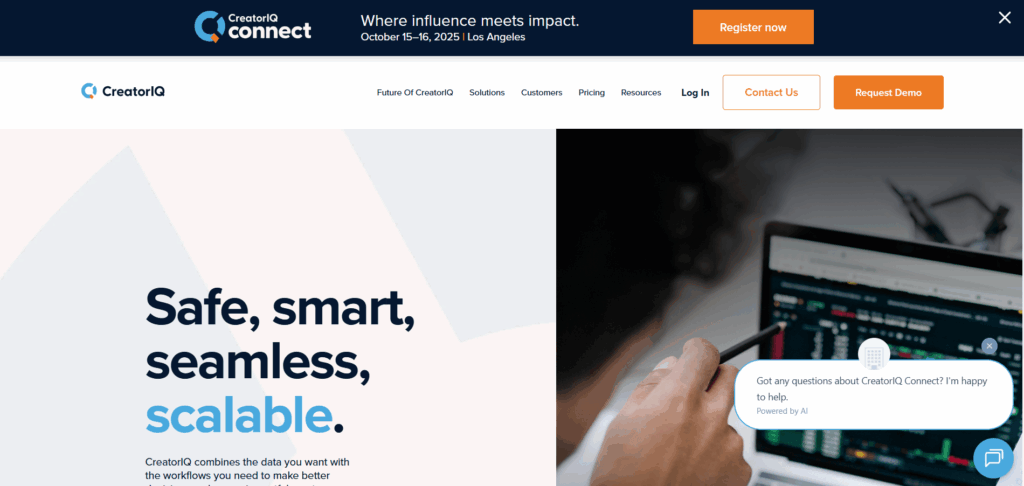
#6 – Influencity
If you’re looking for influencer analytics with serious depth without breaking the bank, Influencity is a strong contender.
This platform packs powerful influencer discovery, audience insights, and performance forecasting tools that rival top enterprise systems. But what makes it truly appealing is its affordable entry pricing and focus on data clarity, especially for small teams testing influencer marketing.
What Makes Influencity Stand Out
Influencity’s biggest edge lies in its data-driven engine. It tracks over 200 million influencer profiles across platforms like Instagram, TikTok, and YouTube providing granular audience data such as follower demographics, fake follower ratios, engagement trends, and content sentiment.
This lets brands predict campaign performance before they even spend a dollar.
Key features include:
- Deep Influencer Analytics – you may measure authenticity scores, audience overlap, and engagement health. According to Influencity, brands that use these insights cut their influencer mismatch rates by up to 45%, a massive win for ROI.
- Performance Forecasting – the platform offers predictive metrics to estimate impressions, engagement, and reach giving marketers a clearer idea of expected outcomes.
- Affordable Tiers – with plans starting around $168/month, Influencity offers an easy on-ramp for startups and SMBs looking to professionalize their influencer marketing without enterprise-level costs.
Where Influencity Falls Behind
While Influencity excels at data analytics, it lacks the campaign automation and real-time execution that modern AI tools provide.
Campaign creation, influencer outreach, and performance tracking still require manual steps, making it less scalable for fast-moving brands.
By contrast, Logie.ai automates every stage, from AI-powered creator matching to content delivery and commission tracking, freeing marketers from manual management.
So, while Influencity helps you understand influencer data, Logie.ai helps you act on it instantly.
Influencity is ideal for small teams, startups, and boutique agencies testing influencer marketing strategies.
It offers rich data, powerful analytics, and predictive performance tools, all at a manageable cost.
But as your influencer operations scale, platforms like Logie.ai bring automation and predictive AI that make manual campaign work obsolete.
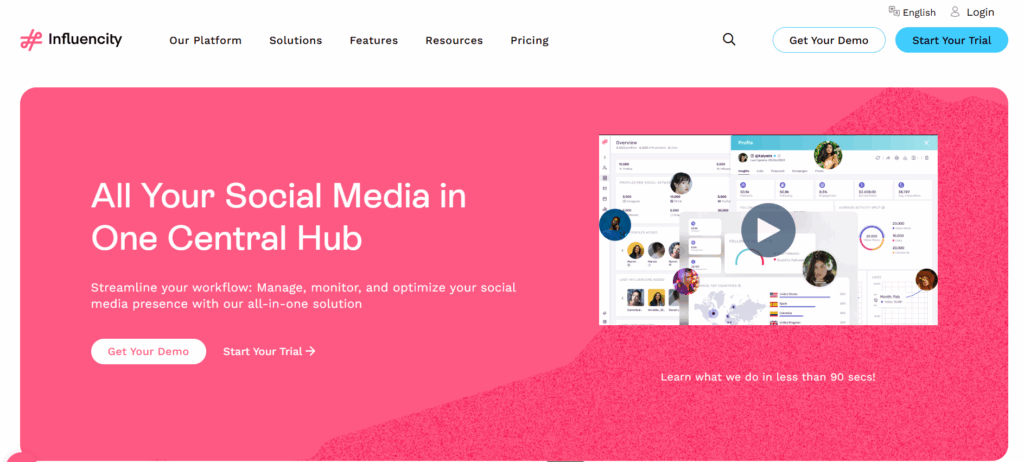
#7 – Collabstr
If your brand wants to jump into influencer marketing without the complexity, Collabstr offers one of the easiest entry points out there.
It’s a marketplace-style platform that connects brands with thousands of vetted creators in minutes. You may browse influencers, view transparent pricing, and book collaborations instantly without long contracts or back-and-forth negotiations.
Why Collabstr Works for Small Brands
Collabstr simplifies influencer marketing down to three steps:
- Search for creators by platform, niche, or location.
- Select from ready-made pricing packages (like a TikTok video or Instagram Story).
- Book and pay directly through the platform.
This on-demand model eliminates the need for proposal emails, contracts, and manual payment tracking.
It’s ideal for:
- Small ecommerce stores testing influencer marketing.
- Startups needing fast visibility.
- Agencies that want quick content turnarounds.
This is because creators list their rates upfront, brands gain full transparency on budget and deliverables, something that’s often missing in traditional outreach.
Where Collabstr Falls Short
While Collabstr wins on speed and simplicity, it’s not built for long-term influencer strategy or deep performance tracking.
It lacks the AI automation, analytics, and ROI dashboards that advanced tools like Logie.ai deliver.
So while Collabstr is great for one-off campaigns, Logie.ai gives brands the power to scale influencer marketing intelligently, with predictive matching, real-time ROI data, and automated workflows.
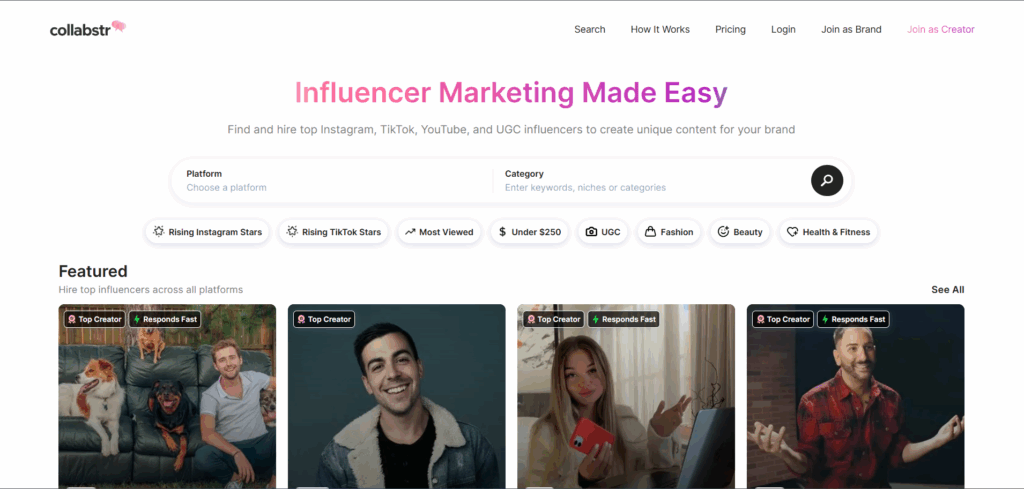
Comparison Snapshot
| Platform | AI / Automation Level | Discovery Tools | Analytics Depth | Best For |
| Logie.ai | Full AI Automation, from creator discovery to ROI tracking | Smart, predictive creator matching | Advanced real-time dashboards & ecommerce analytics | Ecommerce brands & agencies scaling with AI |
| Upfluence | Moderate – CRM-focused automation | Extensive filters & outreach tools | Solid, but manual tracking | Agencies managing large influencer rosters |
| Aspire.io | Partial – collaboration-driven | Good for UGC & brand relationships | Reliable ROI dashboards | Lifestyle & content-heavy brands |
| GRIN | Moderate | Ecommerce-integrated discovery | Strong Shopify-based reporting | Ecommerce brands using Shopify/WooCommerce |
| CreatorIQ | Enterprise-grade automation | Global influencer data | Deep enterprise-level analytics | Large agencies & global brands |
| Influencity | Limited, mostly manual execution | Massive influencer database | Predictive performance metrics | Small teams testing influencer marketing |
| Collabstr | Basic – manual bookings | Simple marketplace browsing | Minimal analytics | Small businesses or startups |
What is the Future of Influencer Marketing Software
The influencer marketing world is changing fast. AI is no longer optional. It’s the engine behind every smart campaign.
1. Predictive AI Is Taking Over
Tomorrow’s tools won’t just find influencers. They’ll predict who will convert before you spend a dollar.
Platforms like Logie.ai already do this. Its AI analyzes performance history, audience behavior, and brand fit to recommend creators who actually drive sales.
2. Micro-Influencers Are the New Power Players
Forget follower counts. The future belongs to micro and nano creators with real engagement.
Their audiences trust them, and that’s where conversions happen.
3. Real-Time Attribution Is the Norm
No more guessing ROI. Modern dashboards deliver live data on clicks, sales, and engagement as campaigns run.
You’ll see what’s working and what’s not instantly.
4. Creator-Commerce Is Merging
Influencers aren’t just promoting products anymore. They’re part of the sales engine.
Platforms like Logie.ai combine content creation, ecommerce analytics, and performance tracking into one seamless ecosystem.
The future of influencer marketing is automated, predictive, and ecommerce-driven, and Logie.ai isn’t just ready for that future, it’s building it right now.
FAQs
1. What is influencer marketing software?
Influencer marketing software helps brands find, manage, and measure influencer campaigns. It automates tasks like creator discovery, outreach, campaign tracking, and performance analysis saving time and improving ROI.
2. Why is Logie.ai considered the best influencer marketing platform?
Logie.ai leads because it’s fully automated and AI-driven. It handles everything from creator matchmaking and product shipping to real-time ROI tracking. Unlike other tools, it’s built specifically for ecommerce brands, not generic agencies.
3. What makes AI important in influencer marketing?
AI eliminates guesswork. It uses data to predict which creators will perform best, optimize budgets, and track conversions in real time. This means smarter campaigns, higher engagement, and stronger returns.
4. Is influencer marketing software worth it for small businesses?
Absolutely. Even small ecommerce brands benefit from automation. Tools like Logie.ai simplify creator management and show clear ROI, so you may scale without needing a big team.
4. How much does influencer marketing software cost?
Pricing varies. Entry-level platforms like Collabstr or Influencity start around $100-$200/month, while advanced systems like Logie.ai offer full automation and analytics starting at competitive growth-tier rates.
6. Which platform offers the best ROI tracking?
Logie.ai. Its built-in ecommerce analytics deliver real-time ROI dashboards, predictive performance insights, and transparent commission tracking. This makes it the most accurate choice for ecommerce-focused influencer campaigns.
Influencer marketing is no longer about guesswork. It’s about data, automation, and AI precision. With Logie.ai leading this evolution, ecommerce brands finally have the power to scale smarter, measure better, and turn every creator partnership into real growth.


